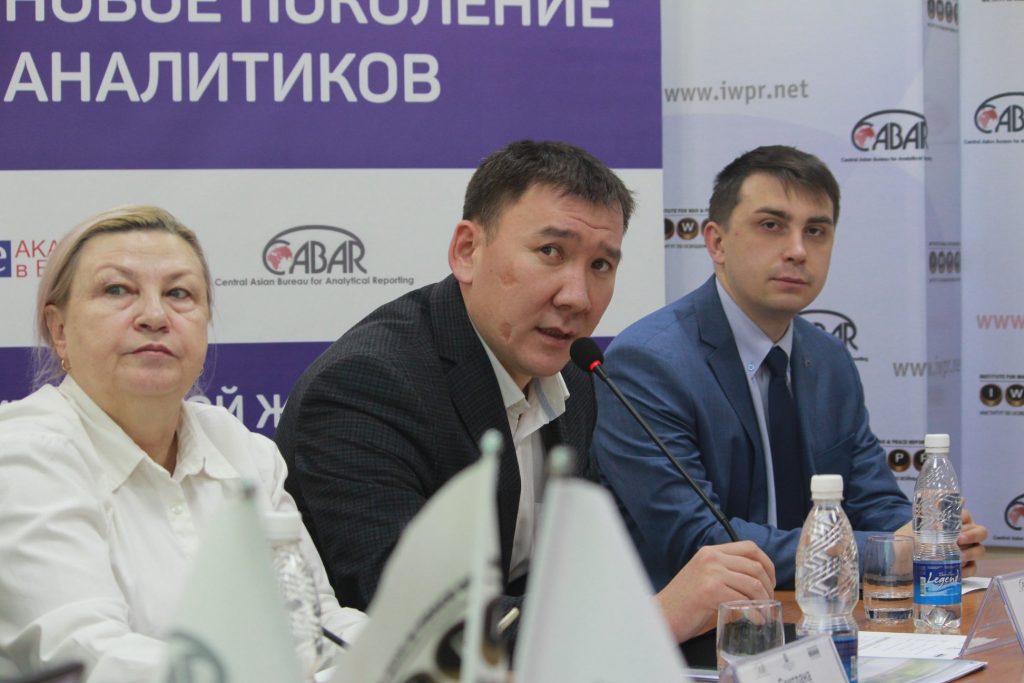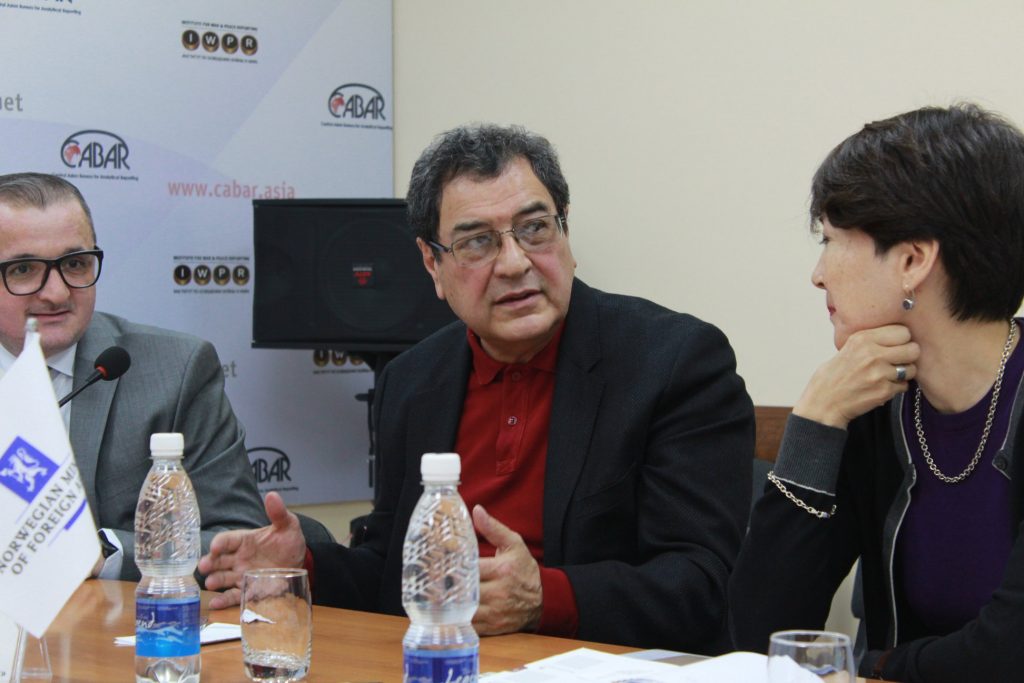The analytical portal cabar.asia has organised a round-table discussion with representatives of Social Fund, non-governmental pension fund and experts at the IWPR’s office in Bishkek.
The speakers were deputy head of pension and tariff policy department of the Social Fund of the Kyrgyz Republic Yntymak Murzakmatov and honorary chairman of Non-Governmental Pension Fund (NPF) Shamil Atakhanov. Zhamilia Toguzbaeva, expert in pension system, Svetlana Bashtavenko, head of Resource Centre for the Elderly, and analyst Denis Berdakov took part in the discussion.
The round-table discussion “Pension system in Kyrgyzstan: challenges and prospects” was organised on the basis of cabar.asia’s reports on the pension system in the republic and challenges in this sphere. For more details on this topic, please see here.
The editorial board first noted that the pension issue concerns all residents of the republic and it has always been a concern. “Lately, various workers, young and middle-aged, often wonder how a pension is formed, what payments they make, how Social Fund disposes of their money, how 2 per cent contributed to the State Pension Savings Fund are being saved.”

Speaking about the pension system, deputy head of pension and tariff policy department of the Social Fund of the Kyrgyz Republic Yntymak Murzakmatov noted that in 1997 employers contributed 36.5 per cent of employee’s wage to the Social Fund and this figure reduced gradually, and it’s 17.25 per cent since 2010. The official added that measures would be taken in future to ease conditions for entrepreneurs. This is necessary to make them come out of the shadow economy. “Favourable conditions will be considered for certain categories of employers. Social Fund is working on this issue,” he said.
As to the disposal of contributors’ money in the form of a funded component, Murzakmatov said that Social Fund was acting under the law “On investment”. “The bulk of money is deposited into government securities as they are the most secure assets,” he added. The agency is going to open an online personal account for contributors in July 2019.
70 per cent of able-bodied citizens don’t contribute to their pension

Speaker Shamil Atakhanov in his speech has emphasised the key challenges of the existing pension system. According to him, the republic has 2.3 million of economically active population. But only 700 thousand contribute to the state pension system. Thus, 1.8 million of able-bodied citizens will not contribute to their pension. This is 70 per cent of economically active population.
He thinks that the pay-as-you-go system implemented by Social Fund is unstable because the International Labour Organisation (ILO) recommends 3 employees per one pensioner. Today, according to official data, 1.2 employees are accounted for one pensioner in terms of mathematics. But if we deduct farmers and sole proprietors from the total number of working population, this number will drop significantly. Only Social Fund has information about the precise number of farmers and sole proprietors.
“This is an important thing to know because today pension for this category of citizens is granted inequitably,” Atakhanov said. “Many farmers contribute quasi-tax at the rate of 100 soms to Social Fund (depending on the location and size of a land plot), while a doctor contributes 3,000 soms from their humiliating salary. And both of them will get rather equal pensions.”
He thinks that the current tariff policy regarding farmers and sole proprietors can destroy the pension system of the Kyrgyz Republic after a while. Atakhanov added that today private pension funds should be developed in the country as non-governmental pension funds are highly important because they provide an opportunity to people to dispose of their own savings. The situation is relevant to migrants, too. According to the expert, they don’t need the state pension system. “Migrants transfer 2.3 billion dollars to the country; they can contribute to their own pension themselves. The state must explain them their rights,” Atakhanov said.
The participant of the round-table discussion, a representative of Resource Centre for the Elderly (RCP) Svetlana Bashtavenko said that Social Fund was the most closed state agency. She noted that the majority of people are unaware of how the pension system works. Bashtavenko was dissatisfied with the method of calculation of the subsistence level related to the average pension rate. Previously she said she addressed the government with a proposal to review the tariff policy and calculated the most optimal tariff for pension calculation, yet her attempts failed.
Expert Denis Berdakov said the younger generation would not have fair pensions in the future. “The state is constantly trying to activate the failed pyramid scheme by attracting foreign donors,” he noted.
A former employee of Social Fund, Zhamilia Toguzbaeva, disagreed with Berdakov’s point of view. Toguzbaeva complained that the funds that were transferred to Social Fund as contributions were immediately paid out to pensioners as pensions. She noted that before Kurmanbek Bakiev came to power, Social Fund had had available funds that were increased through investments into various securities. Later on these funds were used to increase pensions significantly on a non-recurring basis. This measure was still discussed by pensioners, yet it was wrong, experts said.
Also Toguzbaeva added that employees of the agency regularly visited the regions to raise awareness on pension among citizens, but it was difficult to gather people. “People are always busy and reluctant to attend meetings,” she said.
During the discussion, the round-table participants concurred in the opinion that the pension system should be discussed in the society more actively, and it’s the state that should initiate and involve citizens, the society to the understanding of various nuances of the system and its improvement.
The editorial board of analytical portal cabar.asia will continue publishing materials about the pension system of Kyrgyzstan and organising discussions with participation of all parties concerned at its place.
This article was prepared as part of the Giving Voice, Driving Change – from the Borderland to the Steppes Project implemented with the financial support of the Foreign Ministry of Norway. The opinions expressed in the article do not reflect the position of the editorial or donor.


